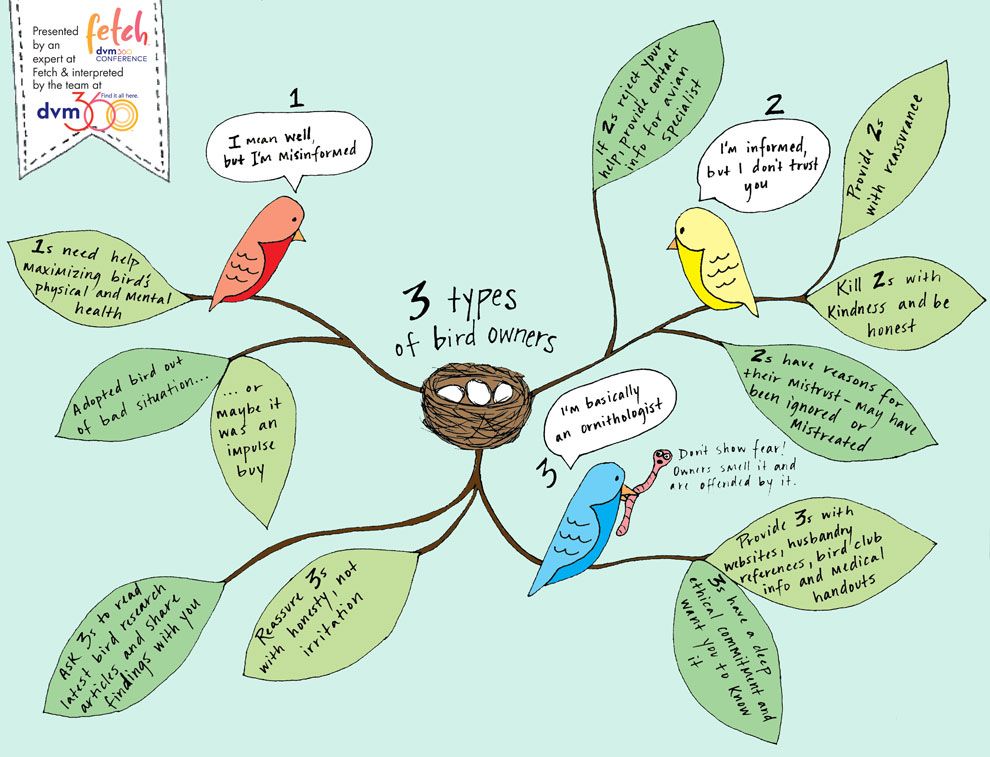The 3 types of bird owners: A Fetch dvm360 conference doodle
Branch out in your understanding of these veterinary clients.
According to the 2017-2018 American Pet Product Association Annual Survey, there are over 20 million pet birds in U.S. households. And while the demand for advanced medical care for birds has grown, general veterinary practitioners' clinical comfort with treating birds hasn't kept pace, says Fetch dvm360 conference speaker, La'Toya Latney, DVM, DECZM.
She says the best place to start is with the owners.
“Ultimately, to improve their care, you will need to shape the behaviors of the human that's attached to the beloved pet. When you understand their attachments, their strengths and their commitment, you gain the trust of those who need your services,” Dr. Latney explains.
And because birds can have particularly long lifespans, these can be very rich and meaningful veterinarian-client relationships.

Illustration by Sarah Mouton Dowdy.The three types of bird owners
If you can determine the type of bird owner in your exam room, you can better know how to provide assistance and improve the health of your patient. Dr. Latney says that from her experience, there are three types of bird owners (though she admits there can be overlaps between the different types).
Type 1: “I mean well, but I'm misinformed.”
Type 1 bird owners perhaps adopted the bird to save it from a bad situation or are first-time owners who bought the bird on a whim. “It's clear that they care,” says Dr. Latney, “but they need guidance to maximize the bird's physical and mental health.”
Type 2: “I'm informed, but I don't trust you.”
Type 2 bird owners tend to be informed but don't trust veterinarians. This mistrust may stem from being mistreated or ignored in the past. “Provide Type 2s with a lot of reassurance. Kill them with kindness and be honest. They, like their pets, will either choose to accept you, or you can kindly offer the contact information of colleagues who are avian practitioners,” Dr. Latney says.
Type 3: “I'm basically an ornithologist.”
“Type 3s have a deep ethical commitment to their feathered companions and are keen to make sure you know that, which is fine,” says Dr. Latney. “Work to reassure them with your honesty, not irritation.” Dr. Latney recommends having websites, husbandry references, bird club information and medical handouts on hand to show that you are well-informed and ready help. She also suggests giving Type 3s homework, such as asking them to read the latest avian research and then report back to you on what they learned. That way, you both learn, which is a win-win.
For all three types, Dr. Latney recommends having a behaviorist on standby so you can refer if necessary. “Be honest about what you are qualified to treat,” she says, “namely, the bird's medical illness.”
UN, WHO address public health concern over avian flu transmission to humans
April 18th 2024Veterinary professionals working with certain animals are advised to take precautionary steps to minimize risk of infection, while researchers in Texas study potential H5N1 vaccines, antivirals, and antibody therapies for humans
Read More